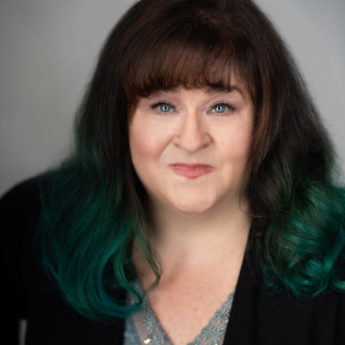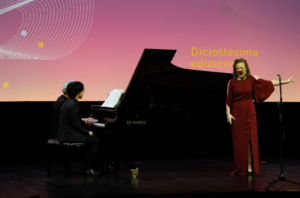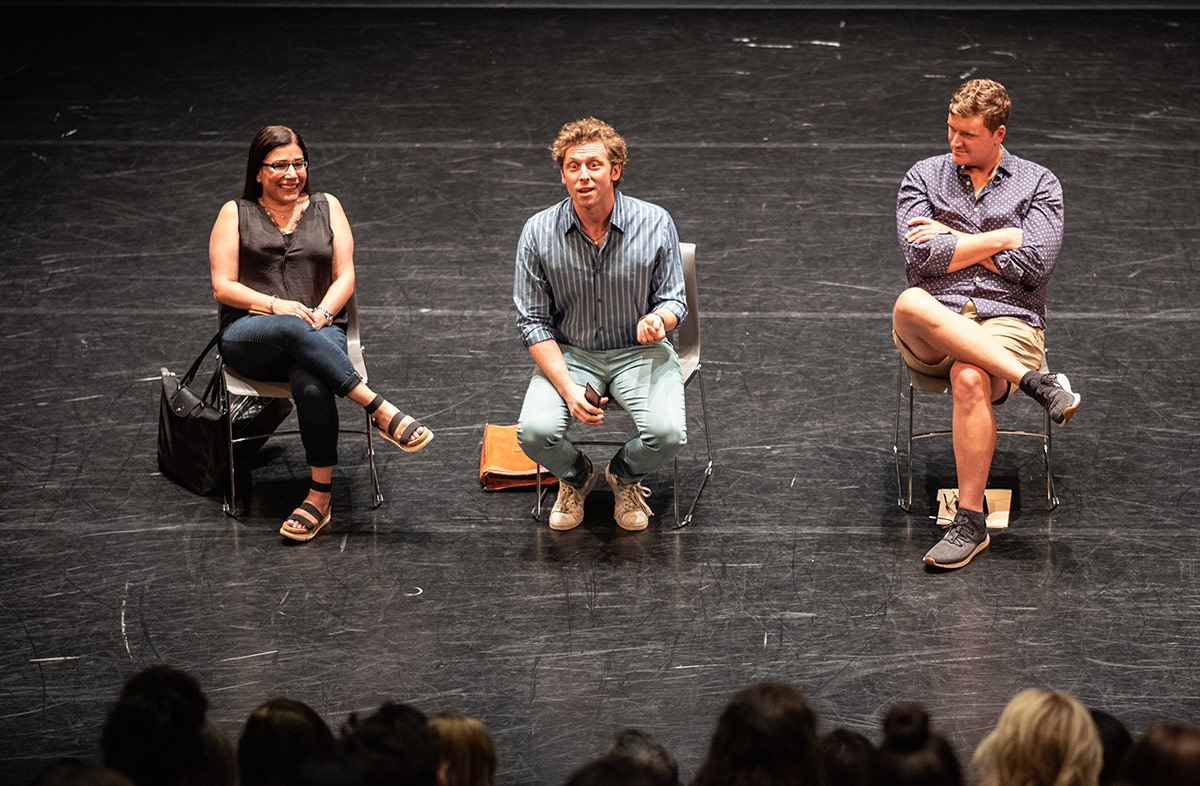As a speech-language pathologist who specializes in voice care, my favorite people to help with their voice concerns are pre-professionals training for careers in theater/TV/film. (If you’ve done an MTCA Vocal Assessment with me, you know how excited I get sharing “voice nerd” info with you in response to your thoughtful questions!) Last week, while speaking on a panel for the annual international celebration of World Voice Day, a high school sophomore asked me a question that I’ve surprisingly never been asked before: “What’s the ONE thing that you consider most important to know about voice care for professional voice users?” Can you guess my answer? Some possibilities that may come to mind for my fellow voice nerds who are reading this:
- Hydrate.
- Moderate your voice use when you’re doing heavy-duty singing (aka vocal naps, marking in rehearsal, occasional vocal rest).
- Be extra aware of your voice use in loud places.
- Make sure you’re studying with a voice teacher who is specifically trained in musical theater vocal pedagogy.
All great answers, but ultimately, not what I chose as my most important piece of voice care knowledge to share. Without further ado, here it is THE MOST IMPORTANT THING TO KNOW ABOUT VOICE CARE!
When you’re experiencing voice concerns or problems, ONLY a fellowship-trained laryngologist can give you an accurate vocal diagnosis!
A fellowship-trained laryngologist is an ENT who exclusively sees patients who are having voice difficulty. (As many of them say, they are ENTs who are just the T.) All of these physicians have not only done a five-year ENT residency post med school, but they’ve also gone on after that to do one or two years of extremely specialized training in management of voice & airway disorders (called their laryngology fellowship). They spend this time working side-by-side with an expert laryngologist mentor doing everything from in-office vocal cord strobing to vocal fold and airway surgeries. They eventually do all of these things on their own while their mentoring physician observes. Once they complete their laryngology fellowships, these highly-specialized ENTs spend a great deal of their patient care time helping singers, actors, broadcasters, teachers, sales people, and other professional voice users. Here are the specifics about WHY is it so important to see a fellowship-trained laryngologist for any voice concerns.
YOU’RE A PROFESSIONAL ATHLETE – A VOCAL ATHLETE!
Think of any specialized professionals whose bodies are integral to their careers: instrumentalists, sports pros, Olympians, dancers… They would never entrust their specific career-related physical needs to a general orthopedic doctor. Instead, they go straight to the expert in the physical demands of their career: hand specialists for pianists, shoulder specialists for baseball players with throwing injuries, knee reconstruction specialists for basketball players who experience major knee injuries. Vocal athletes, and that’s what you are as a professional voice user, need to go straight to the physicians who are the only true experts in voice care.
Vocal athletes, and that’s what you are as a professional voice user, need to go straight to the physicians who are the only true experts in voice care.
Fellowship-trained laryngologists truly understand the specific physical demands of doing eight-show weeks, or being in a voiceover booth all day recording an audiobook, of doing Shakespeare outside and unamplified, even of being a busy senior in high school and auditioning for college theater programs! Because of their experience with all of these situations and more, fellowship-trained laryngologists can make a voice care plan that aligns with your specific vocal demands.
THE ONLY CORRECT DIAGNOSES COME FROM THE USE OF THE CORRECT EQUIPMENT
In addition to the experience of a voice medicine fellowship, laryngologists are the ONLY physicians who have the right equipment to look at your vocal folds. Yes, all ENTs have scopes that can look at the surface of your vocal cords through a skinny tube inserted into your nose, but only laryngologists have scopes with specialized, high-definition cameras that both capture the details of the surface of your vocal folds and also have a strobe function. Without a specialized camera connected to a big TV screen and a strobe light, the physician can’t see your vocal folds move, because the vocal folds are too tiny and move far too fast (@90 times a SECOND for baritone/tenor speaking voices and 200x/second for alto/soprano speaking voices) for the naked human eye to capture any detail. Without clear visualization of both vocal fold tissue and vocal fold vibration, there’s no accurate vocal diagnosis!
Without clear visualization of both vocal fold tissue and vocal fold vibration, there’s no accurate vocal diagnosis!
I have so many stories about both students and Broadway professionals who were giving absolutely wrong diagnoses by seeing a NON-laryngologist, in part because the wrong equipment was used to scope.
SO HOW DO I FIND A FELLOWSHIP-TRAINED LARYNGOLOGIST?
- Look for a VOICE CENTER in your area. These are medical practices that have both laryngologists and voice-specialist speech pathologists (known as voice therapists in this setting) in one office. They’re sometimes called Voice and Swallowing Centers.
- If you’re sure your voice teacher is very knowledgeable about CURRENT voice science, ask them if they know of FELLOWSHIP-TRAINED LARYNGOLOGISTS in your area. Remember, just because a doctor “sees all the singers” in your area does NOT mean they’re a laryngologist.
- Use this website: https://alahns.org/find-a-laryngologist/#!directory/map/ord=lnm (Note: Not every person listed here is a practicing laryngologist: some are voice scientists or retired laryngologists. Once you find a name in your area, google and read the bios.
If you have any specific vocal concerns that you’d like to ask me about, you can schedule consultation time with me through MTCA! Although a professional voice care expert, I am NOT a physician, but I can refer you to a specific fellowship-trained laryngologist in your area if needed!
#voicenerdsunite #voicenerdsrock
About the Author

Ellen Lettrich is the Founder of MTCA and the Founder and current Executive Director of The Fund for College Auditions, a 501(c)(3) nonprofit that supports low-income students from underrepresented groups throughout their college audition process. Ellen has been a theatre educator focusing on the college audition process since 1999. She is also a licensed speech pathologist who specializes in voice and in this role has been Assistant Vocal Coach for Matilda on Broadway and Vocal Coach for Hand to God both on Broadway and off. She loves her continued work with MTCA as a voice analyst and resident Coaching Team Grandma.




